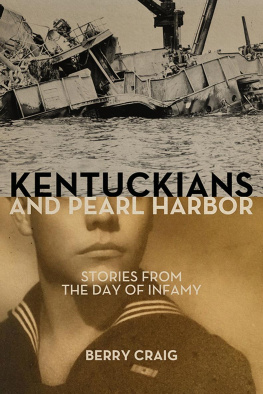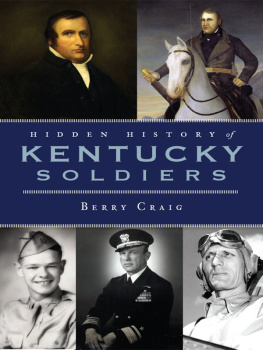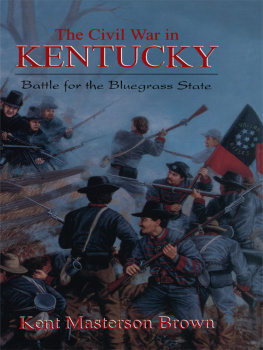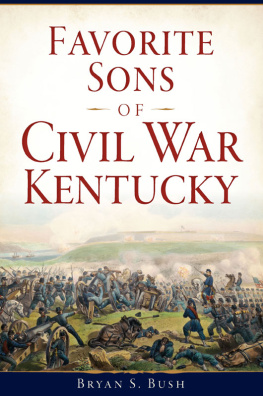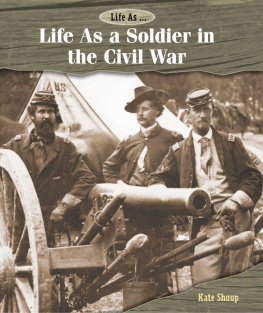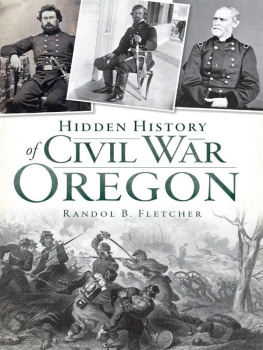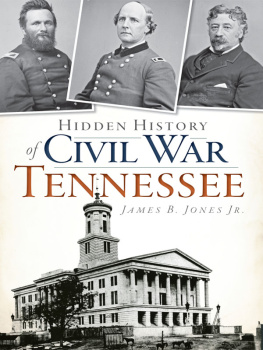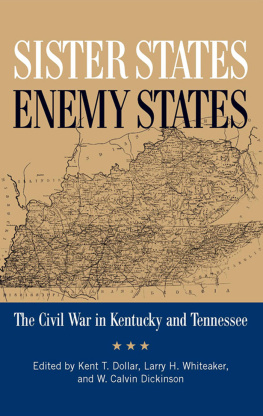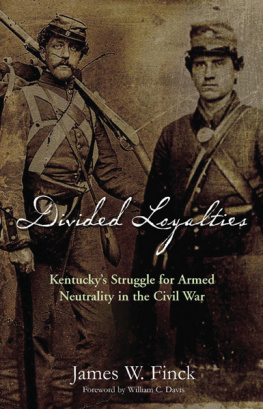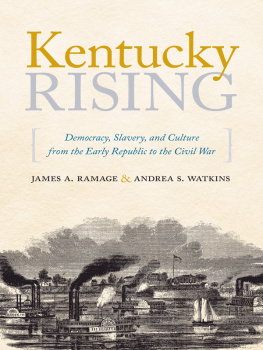HIDDEN HISTORY
OF
KENTUCKY
IN THE CIVIL WAR
BERRY CRAIG

Published by The History Press
Charleston, SC 29403
www.historypress.net
Copyright 2010 by Berry Craig
All rights reserved
First published 2010
e-book edition 2011
ISBN 978.1.61423.103.5
Library of Congress Cataloging-in-Publication Data
Craig, Berry.
Hidden history of Kentucky in the Civil War / Berry Craig.
p. cm.
print edition ISBN 978-1-59629-853-8
1. Kentucky--History--Civil War, 1861-1865--Anecdotes. 2. United States--History-
Civil War, 1861-1865--Anecdotes. 3. Kentucky--Biography--Anecdotes. I. Title.
E509.C735 2010
976.903--dc22
2010003089
Notice: The information in this book is true and complete to the best of our knowledge. It is offered without guarantee on the part of the author or The History Press. The author and The History Press disclaim all liability in connection with the use of this book.
All rights reserved. No part of this book may be reproduced or transmitted in any form whatsoever without prior written permission from the publisher except in the case of brief quotations embodied in critical articles and reviews.
To Professor Roy O. Hatton of Murray State University, my mentor and a
student of T. Harry Williams, and to his late wife, Marjorie Hatton,
who always laughed at my jokes.
Contents
Introduction
Divided We Stood
United We Stand, Divided We Fall is Kentuckys motto. Yet the Civil War sharply split the Bluegrass State.
Kentucky natives headed the Union and Confederate governments. President Abraham Lincoln, the sixteenth president of the United States, was born near Hodgenville in 1809. Jefferson Davis, the Confederacys only president, was born in Fairview the year before.
Kentucky did not secede from the Union and join the Confederacy. Nonetheless, Kentucky had a star on both the American and Confederate flags. Some secessionists created their own Confederate state government. Dubious as the action was, it was enough to get Kentucky admitted as the thirteenth Confederate state. (Missouri, a border slave state like Kentucky, also had a rump Rebel government and was the twelfth Confederate state.)
Kentucky furnished between 90,000 and 100,000 men to the Union side. Another 25,000 to 40,000 Kentuckians joined in the Confederate forces, according to A New History of Kentucky by Lowell H. Harrison and James C. Klotter. The Union total includes more than 23,700 African Americans. Only Louisiana furnished more black troops to the Union military than Kentucky did.
Probably every Kentucky county supplied men to both sides, though the ratios varied. Most Kentucky counties sent more men north than south. But some counties gave almost equal numbers of soldiers to the Union and the Confederacy.

President Abraham Lincoln. Courtesy of the Kentucky Historical Society.
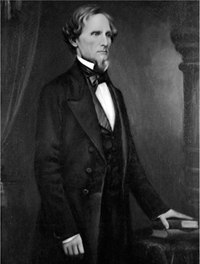
President Jefferson Davis. Courtesy of the Kentucky Historical Society.
The war sundered many Kentucky families, from the humblest to the richest and most powerful. Breckinridge, Clay and Crittenden men were found in Union blue and Confederate gray. Even First Lady Mary Todd Lincoln had Rebel relatives in her native Kentuckyher half sister was married to Confederate General Ben Hardin Helm.
Kentuckians fought Kentuckians in some of the bloodiest battles of Americas bloodiest war. The names and faces of the winning and losing generals of those battles are in most history books.
But this book is not like most history books. It is about hidden history. Most of these stories are not found in other history books. Some of them are proof that the Civil War was truly a brothers war in the home state of Lincoln and Davis.
Divided we stood.
Part I
18601861
A N I NFERNAL O LD J ACKASS
No son of Kentucky is more famous or more revered than Abraham Lincoln, and rightly so.
His birthplace close to Hodgenville, the Larue County seat, is a national shrine. Lincolns statue stands tall in the capitol rotunda in Frankfort.
However, no president lost an election in Kentucky by a wider margin than did the Great Emancipator. When he ran in 1860, Lincoln got less than 1 percent of the vote.
No president, while in office, was more unpopular in the Bluegrass State than was Lincoln. People are amazed when I tell them what most Kentuckians really thought of Lincoln, said historian and writer Ron Bryant, manager at Waveland State Historic Site in Lexington. Lincoln and the Republicans opposed slavery. Kentucky was a slave state.
Kentuckians reviled Lincoln from Paducah to Pikeville. In one letter, a young hothead from Lexington called the president an infernal old Jackass, according to Lincoln and the Bluegrass: Slavery and Civil War in Kentucky by William H. Townsend. I should relish his groans and agonies if I could see him put to torture in hell or anywhere else, the youth added. He has chosen to become the representative of the Republican Party and as such I should like to hang him.
According to Townsend, the Lexington Kentucky Statesman charged that Lincoln was afraid to visit his native state because voters would catch him, tar and feather him, and set him on fire to make a torch-light procession of him.
In 1860, John Bell, candidate of the Constitutional Union Party, earned Kentuckys dozen electoral votes. He collected 66,051 ballots to 53,143 for John C. Breckinridge of Lexington, the southern Democrat, and 25,638 for northern Democrat Stephen A. Douglas, according to Presidential Politics in Kentucky, 18241948 by Jasper B. Shannon and Ruth McQuown. Lincolns total was 1,364, the authors added.
Lincoln won a second term in 1864, running on the Union ticket. He lost Kentucky again but fared better in the Bluegrass State, carrying 25 of 101 counties that posted returns. Even so, Democrat George B. McClellan outpolled Lincoln 64,301 to 27,787. Kentucky thus gave the president the lowest vote [he]received in any of the 25 states which participated in the balloting, Shannon and McQuown wrote.
Lincoln, one of Americas greatest presidents, became popular in Kentucky only after he was assassinated in 1865, according to Bryant. Other historians agree.
A great transformation seems almost mysteriously to have swept over the people when the word came that Lincoln was dead, wrote E. Merton Coulter in The Civil War and Readjustment in Kentucky. From their customary attitude of condemnation and vilification, they now turned to honoring and praising.
T HE C ONFEDERACY OF P ORTLAND
Heres a Civil War history quiz. Which seceded first?
A. South Carolina.
B. Louisvilles Portland neighborhood.
If you answered B, go to the head of the class. Portlands always had an independent streak, said Tom Owen, a University of Louisville archivist and historian. Tiny Portland seceded from Louisville on December 1314, 1860. South Carolina left the Union on December 20.
Portlands secession was a prank, according to Robert Emmett McDowells book City of Conflict: Louisville in the Civil War 18611865. The joke ceased to be funny when news of actual secession burst like a bomb on the city a week later, the author added.


